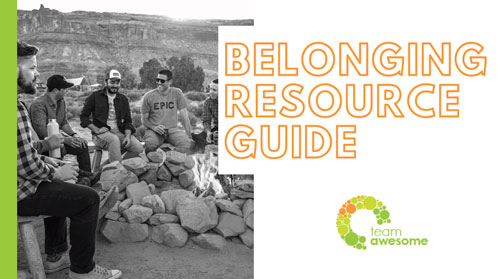I often hear from leaders that they want to be more effective at really getting to know their team, and to create a culture of trust with their team. And, these same leaders don’t always know what comes next to make that actually happen.
Surely there are some big leadership diets one can do – but I will be honest, most people don’t just wake up and suddenly change their ways (with a few major fictitious cinematic exceptions, such as Hallmark movies and Ebenezer Scrooge). Instead of a diet, it can be more of small lifestyle changes that don’t take a heavy lift for the leader but make a big impact to those around them.
Make no mistake, you have to practice. All of these things are part of the hundreds of tiny moments we all have throughout the day to either increase, or erode, trust and community with our team. Do these small things repeatedly and they will build an impactful leadership muscle over time.
Eye Contact: Really See People
If you haven’t ever paid attention to this, here is your invitation. Spend a day simply being aware of if you are actually making eye contact with people, and when you are really seeing the human standing before you in the present moment. I trust you will find it shocking just how much you are looking at your phone, staying busy on your computer in the moments before the meeting started, or simply were thinking (and looking) somewhere else when you conversed with Cindy in accounting.
Here are some questions that you should be able to answer if you were really seeing people:
- Do you remember what someone was wearing today?
- What emotions did you notice on that person’s face when they were in the meeting?
- What did you notice they saw in you today?
Continue Your Conversation
If one day your team member was telling you about their little league travel tournament they were attending that weekend, ask them about how the tournament went on Monday. In your conversation, find out a new detail about their outside-of-work life that you can continue in the next conversation. As in, “Oh wow, I didn’t realize that you COACH the Little League travel team” can become a future conversation point such as, “What’s been the best part of coaching a team of ten-year-old boys for you?”
Learn the names of people’s children, learn what they do with their time when they aren’t at work. With more trust, learn what responsibilities tug at their time and energy. You will have a much richer relationship inside of work as a result.
Listening
Some of the best feedback you will give comes from you truly understanding the situation. If you listen with intent to really hear the other person before formulating your answer, you will inevitably craft more valuable feedback. In the moment, remember WAIT (Why Am I Talking?).
There are three levels of listening:
- Listening to respond
- Listening to hear
- Listening to feel
If you find yourself at Level 1 listening, you will be most effective by working on actively listening at a minimum at Level 2. [Read more in depth about the Levels of Listening here]
Meet One-on-One Regularly: No Skips
One of the most important actions any leader can take is to create an impenetrable one-on-one process on the calendar for every direct report. Put it on the calendar and honor it fiercely. That means, never cancel unless one of you is on vacation.
The worst-case scenario is that people have no one-on-one time with their leader. The second worst-case is having them on the calendar and them knowing darn well it isn’t real because you are going to cancel it, move it, or make it irrelevant in how you spend that precious time.
Plan the time, protect it fiercely, and use it wisely. I even have a 12-week process for that if that’s helpful for you.
Phrases of Trust
Adopt some phrases that you say out loud to others to show that you trust them, and that you’ve got their back. Some of my best bosses have this in common. We fiercely trusted each other. And some of my worst work experiences are the opposite, and it felt completely unsafe.
Here are some simply great ones:
- I’ve got you.
- I know you’ve got this.
- I will support the decision you make.
- What support do you need from me?
- I have high expectations, and I know you can reach them. (Growth Mindset, from Carol Dweck!)
Ask, “How Are You Today?”
I don’t know about you, but if anyone has asked “How are you?” to me in the last, oh, four years or so, I have a mini moment of panic. [Like, what do you mean, this week? This Year? Amongst ALL THIS *wildly gesturing around me*] Because of this regular existential mini-meltdown in my monkey brain, I have switched this question with one small word: Today. Instead, ask “How are you today?” This is a much more manageable time frame for me to answer, even when I’ve lived lifetimes by 9:00 a.m. This allows me to feel pretty good today, even in spite of the fact that I lost a loved one I am grieving last week.
Truly, these are useful skills to build and use with any humans in your life. I think above all, we all just want to be seen and loved. And that can be just as powerful in the workplace.
I hope you go out and lift these repeatedly like bicep curl reps. Over and over. Forever. Enjoy!



Very good advice and insights. Proud of you as an alumnus of UW Oshkosh
Thank you, Al! Thanks for reading and always cheering me on.